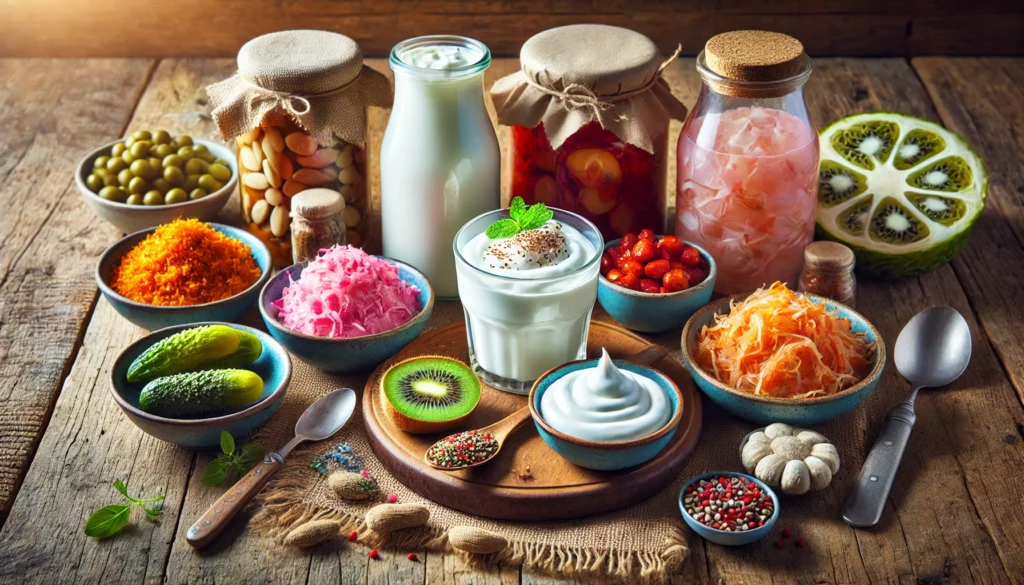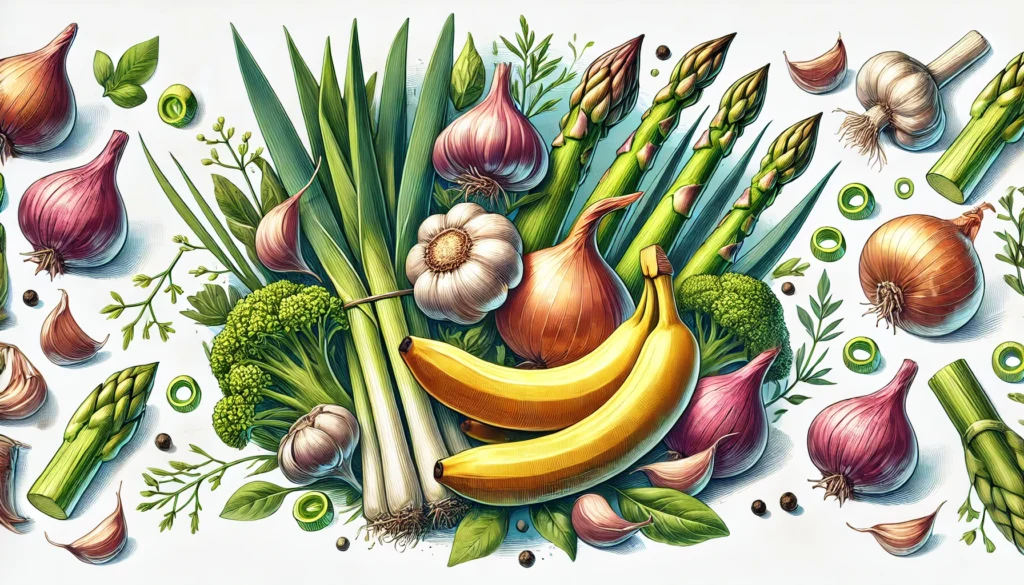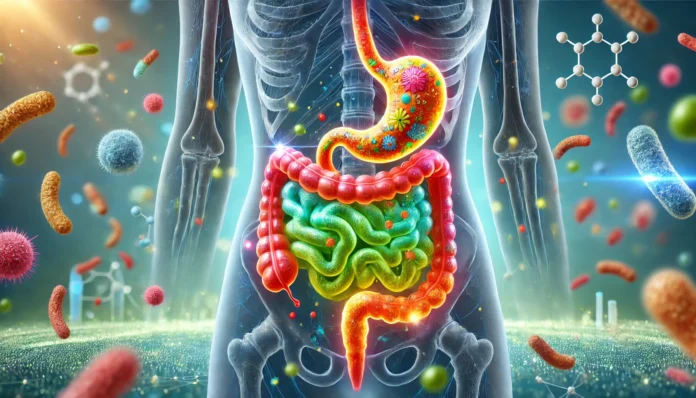The gut microbiome plays a pivotal role in overall health, influencing digestion, immune function, and even mental well-being. However, an imbalance in gut bacteria, where harmful microbes outnumber beneficial ones, can lead to numerous health complications. Understanding how to get rid of bad bacteria in the gut naturally is essential for maintaining optimal health. This article explores science-backed strategies, including dietary adjustments, probiotics, prebiotics, lifestyle changes, and natural antibacterial agents that support a healthier gut microbiome.
You may also like: How to Improve Gut Health Naturally: Science-Backed Tips for a Stronger Microbiome
Understanding the Gut Microbiome and Its Importance
The gut microbiome consists of trillions of microorganisms, including bacteria, fungi, and viruses, residing primarily in the intestines. While many of these microbes contribute to digestion, vitamin synthesis, and immune function, some can become pathogenic when allowed to proliferate unchecked. Factors such as poor diet, antibiotic use, stress, and environmental toxins can disrupt the balance, allowing harmful bacteria to thrive. The key to restoring gut health lies in understanding what naturally kills bad bacteria in the gut and implementing targeted strategies to cultivate a beneficial microbial environment.
The Role of Diet in Eliminating Harmful Gut Bacteria
Diet is one of the most influential factors in shaping gut microbiota. Consuming processed foods, refined sugars, and unhealthy fats can promote the growth of harmful bacteria while depleting beneficial strains. To counteract this, it is crucial to incorporate whole foods rich in fiber, antioxidants, and essential nutrients. Fermented foods like yogurt, kefir, sauerkraut, and kimchi introduce beneficial probiotics that can outcompete harmful microbes. Additionally, fiber-rich foods such as legumes, whole grains, fruits, and vegetables act as prebiotics, providing nourishment for beneficial bacteria while starving pathogenic strains.
How to Starve Bad Gut Bacteria with a Strategic Diet
Harmful bacteria thrive on refined carbohydrates and sugars, making dietary modifications a powerful tool in restoring balance. Reducing sugar intake and eliminating processed foods can help deprive bad bacteria of their primary fuel source. Incorporating foods that naturally inhibit bacterial overgrowth, such as garlic, onions, and cruciferous vegetables, can further support gut health. Additionally, consuming polyphenol-rich foods like berries, green tea, and dark chocolate has been shown to promote the growth of beneficial bacteria while suppressing harmful strains.
The Power of Probiotics in Gut Health
Probiotics are live beneficial bacteria that support digestive health and strengthen the gut barrier. These microorganisms compete with harmful bacteria, produce antimicrobial substances, and modulate the immune system to prevent infections. Common probiotic strains, such as Lactobacillus and Bifidobacterium, have been extensively studied for their ability to restore gut balance. Regular consumption of probiotic-rich foods or high-quality supplements can significantly improve gut flora composition, reducing the risk of dysbiosis and associated health issues.

Prebiotics: Fuel for Beneficial Bacteria
Prebiotics are non-digestible fibers that serve as food for beneficial gut bacteria, promoting their growth and activity. Sources of prebiotics include bananas, asparagus, garlic, onions, leeks, and whole grains. By feeding good bacteria, prebiotics help crowd out harmful strains and support overall gut function. Research has shown that prebiotics can enhance the effectiveness of probiotics, creating a symbiotic relationship that fosters a healthier microbiome.
Natural Antimicrobial Agents to Kill Harmful Gut Bacteria
Several natural compounds have antimicrobial properties that selectively target harmful bacteria while preserving beneficial strains. Garlic, for example, contains allicin, a powerful antibacterial compound that can inhibit pathogenic microbes. Oregano oil has been shown to be effective against harmful bacteria and fungi without disrupting the overall microbial balance. Coconut oil, rich in lauric acid, has demonstrated antimicrobial effects against various gut pathogens. These natural remedies can serve as adjunct therapies to dietary and lifestyle interventions aimed at improving gut health.
The Impact of Stress on Gut Bacteria
Chronic stress can negatively influence gut bacteria by increasing inflammation and altering microbial composition. The gut-brain axis, a bidirectional communication pathway between the gut and brain, plays a significant role in regulating microbial balance. Stress reduction techniques such as meditation, yoga, deep breathing exercises, and adequate sleep can help restore gut health by modulating stress hormones and supporting a balanced microbiome.
Exercise and Gut Health
Physical activity has been linked to a diverse and resilient gut microbiome. Moderate exercise promotes the growth of beneficial bacteria while reducing inflammation and improving gut motility. Studies have shown that individuals who engage in regular physical activity have a more favorable gut microbial composition compared to sedentary individuals. Incorporating activities such as walking, jogging, swimming, and strength training can contribute to a healthier gut environment.
The Role of Hydration in Maintaining Gut Health
Adequate hydration supports digestion, nutrient absorption, and the elimination of toxins from the gut. Water helps maintain the mucosal lining of the intestines, which acts as a barrier against harmful bacteria. Consuming herbal teas with antimicrobial properties, such as ginger or peppermint tea, can further enhance gut health by reducing inflammation and supporting digestion.

Frequently Asked Questions (FAQ) on Gut Health and Bacterial Balance
1. What are the primary causes of an imbalance between good and bad gut bacteria?
An imbalance in gut bacteria, known as dysbiosis, can be triggered by several factors. A diet high in refined sugars, unhealthy fats, and processed foods fuels the proliferation of harmful bacteria while depriving beneficial microbes of essential nutrients. Frequent antibiotic use, while sometimes necessary, can indiscriminately kill both good and bad bacteria, leading to microbial imbalance. Chronic stress and sleep deprivation also negatively impact gut health by increasing inflammation and reducing the diversity of beneficial bacteria. Additionally, exposure to environmental toxins, such as pesticides and heavy metals, can alter gut microbiota composition, making it crucial to support detoxification through diet and lifestyle changes.
2. What naturally kills bad bacteria in the gut without harming good bacteria?
Certain natural compounds can selectively target harmful bacteria while preserving beneficial microbes. Garlic, for instance, contains allicin, which has potent antibacterial properties but does not significantly disrupt beneficial flora. Oregano oil, rich in carvacrol and thymol, is effective against pathogenic bacteria and fungi while supporting a balanced microbiome. Probiotic-rich foods, such as kefir and sauerkraut, introduce beneficial bacteria that naturally crowd out harmful strains. Additionally, green tea polyphenols have been shown to suppress pathogenic bacteria while encouraging the growth of beneficial gut microbes. By incorporating these natural antibacterial agents into your diet, you can promote gut health without resorting to broad-spectrum antibiotics that may lead to dysbiosis.
3. How does fiber help starve bad gut bacteria?
Fiber plays a crucial role in gut health by serving as a prebiotic that nourishes beneficial bacteria while depriving harmful bacteria of their preferred food sources. Insoluble fiber helps sweep out waste and toxins, creating an environment less conducive to pathogenic bacterial overgrowth. Soluble fiber, found in foods like oats, legumes, and apples, ferments in the gut and produces short-chain fatty acids, which enhance gut barrier function and inhibit the growth of harmful microbes. By increasing fiber intake, individuals can effectively alter the gut microbiome, making it less hospitable to bad bacteria. Furthermore, fiber-rich diets have been linked to lower levels of inflammation, which can help maintain gut integrity and prevent bacterial imbalances.
4. Can fasting help get rid of bad bacteria in the gut?
Fasting can be an effective strategy for rebalancing gut bacteria by allowing the digestive system to reset and eliminating excess harmful microbes. Intermittent fasting, in particular, has been shown to promote autophagy, a cellular process that removes damaged cells and pathogens, including harmful bacteria. By taking breaks from food, you deprive bad bacteria of their primary fuel source—simple sugars and processed carbohydrates—while allowing beneficial bacteria to flourish. Additionally, fasting supports the production of gut-protective compounds such as butyrate, which strengthens the intestinal lining and reduces inflammation. However, it is essential to reintroduce nutrient-dense foods after fasting to nourish beneficial gut flora and maintain long-term microbial balance.
5. How do stress and mental health affect gut bacteria?
The gut-brain axis is a bidirectional communication system between the gut and the central nervous system, meaning stress and emotional well-being directly influence gut bacteria. Chronic stress increases cortisol levels, which can compromise gut barrier function and promote the overgrowth of harmful bacteria. Studies have shown that people experiencing high levels of anxiety or depression often have altered gut microbiota, with reduced diversity and an imbalance favoring pathogenic microbes. Practices such as mindfulness meditation, deep breathing exercises, and physical activity can help mitigate stress-related gut issues. Additionally, consuming probiotic and prebiotic foods can positively impact mood and cognitive function by promoting the production of neurotransmitters such as serotonin and GABA.
6. What role do fermented foods play in killing harmful gut bacteria?
Fermented foods contain live probiotics that compete with harmful bacteria for space and nutrients in the gut. Foods like kimchi, miso, and yogurt introduce strains of beneficial bacteria that enhance microbial diversity and reduce the likelihood of bad bacteria thriving. The fermentation process also produces organic acids, such as lactic acid and acetic acid, which create an acidic environment that is unfavorable to pathogenic microbes. Regular consumption of fermented foods has been linked to improved digestion, reduced inflammation, and enhanced immune function. However, it is important to choose unpasteurized varieties, as pasteurization kills beneficial probiotic bacteria that contribute to gut health.
7. Are there specific lifestyle habits that support a balanced gut microbiome?
Several lifestyle habits contribute to a well-balanced gut microbiome. Regular physical activity enhances microbial diversity by increasing levels of beneficial bacteria, particularly those associated with reduced inflammation. Prioritizing high-quality sleep is also crucial, as disruptions in circadian rhythms can lead to an imbalance in gut flora. Limiting alcohol and processed food intake prevents damage to the intestinal lining and supports beneficial bacteria. Staying hydrated is another essential factor, as water helps maintain the mucosal lining of the intestines, creating a protective barrier against harmful microbes. Additionally, spending time outdoors and engaging in activities like gardening or hiking exposes individuals to diverse environmental bacteria, which can positively influence gut microbial composition.
8. How do antibiotics affect gut bacteria, and how can you recover after taking them?
While antibiotics can be life-saving, they often have the unintended consequence of disrupting gut microbiota by eliminating both harmful and beneficial bacteria. This disruption can lead to overgrowth of opportunistic pathogens such as Clostridium difficile, which can cause severe gastrointestinal distress. To support gut recovery after antibiotic use, consuming a diet rich in prebiotics and probiotics is essential. Fermented foods, fiber-rich vegetables, and resistant starches help replenish beneficial bacteria and restore microbial balance. Additionally, taking a high-quality probiotic supplement specifically designed to counteract antibiotic-associated dysbiosis can expedite the healing process.
9. Can gut bacteria influence weight management and metabolism?
Emerging research suggests that gut bacteria play a significant role in weight management and metabolic health. Beneficial bacteria help regulate energy metabolism, insulin sensitivity, and fat storage by influencing how the body processes and absorbs nutrients. Certain strains of gut bacteria, such as Akkermansia muciniphila and Bacteroides, have been associated with lean body weight and improved metabolic function. Conversely, an overabundance of harmful bacteria can contribute to chronic inflammation and insulin resistance, both of which are linked to obesity. By adopting dietary habits that promote beneficial gut bacteria—such as consuming fiber-rich foods and reducing processed sugar intake—individuals can support a healthier metabolism and weight balance.
10. How long does it take to restore gut health after making dietary changes?
The timeline for restoring gut health varies depending on the severity of dysbiosis, individual lifestyle factors, and consistency in implementing gut-friendly habits. Some individuals may notice improvements in digestion, energy levels, and mood within a few weeks of making dietary changes. However, complete restoration of gut microbial balance can take several months, particularly if there has been prolonged exposure to antibiotics, chronic stress, or a diet lacking in fiber and fermented foods. The key to long-term gut health is consistency—adopting a diverse, plant-based diet, incorporating probiotic and prebiotic foods, managing stress, and staying physically active will help maintain a resilient and balanced microbiome over time.

Conclusion: Achieving a Balanced and Healthy Gut Microbiome
A healthy gut microbiome is essential for overall well-being, influencing digestion, immunity, and even mental health. By adopting a diet rich in whole foods, incorporating probiotics and prebiotics, utilizing natural antimicrobial agents, managing stress, exercising regularly, and staying hydrated, individuals can effectively eliminate harmful bacteria and support beneficial microbes. Understanding how to get rid of bad bacteria in the gut naturally empowers individuals to take control of their health and foster a balanced microbiome for long-term wellness.
microbiome and brain health, gut flora and mood regulation, fermented foods for mental clarity, holistic gut health, probiotics for emotional balance, digestive wellness and cognition, mind-gut connection, brain-friendly nutrition, neuroprotective foods, stress reduction through diet, beneficial gut bacteria, gut microbiota and neurotransmitters, fermented superfoods, gut health for anxiety relief, brain-supporting diet, natural mental wellness, anti-inflammatory diet for brain health, gut bacteria and serotonin production, cognitive benefits of fermented foods, mood-boosting nutrition
Further Reading:
Science-backed tips on how to boost your gut microbiome
Helping ‘good’ gut bacteria and clearing out the ‘bad’
How To Get Rid of Bad Bacteria in the Gut
Disclaimer
The information contained in this article is provided for general informational purposes only and is not intended to serve as medical, legal, or professional advice. While Health11News strives to present accurate, up-to-date, and reliable content, no warranty or guarantee, expressed or implied, is made regarding the completeness, accuracy, or adequacy of the information provided. Readers are strongly advised to seek the guidance of a qualified healthcare provider or other relevant professionals before acting on any information contained in this article. Health11News, its authors, editors, and contributors expressly disclaim any liability for any damages, losses, or consequences arising directly or indirectly from the use, interpretation, or reliance on any information presented herein. The views and opinions expressed in this article are those of the author(s) and do not necessarily reflect the official policies or positions of Health11News.


